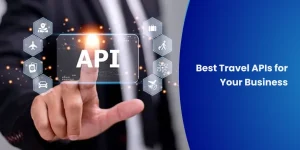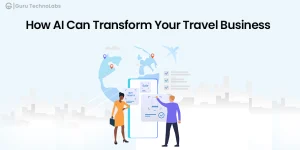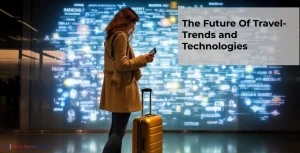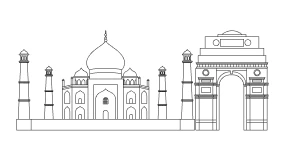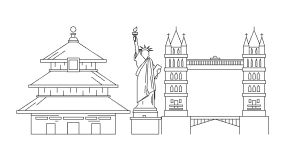A Guide to Choosing the Right CRM for Travel Companies

Choosing the right Customer Relationship Management (CRM) software is really important for travel companies. The right CRM can help you organize your work, strengthen connections with your customers, and sell more.
In this guide, we’ll explain what a CRM is, talk about its benefits, and give you tips on how to pick the best CRM for your travel agency. Whether you’re new to CRM systems or want to upgrade, this guide will help you choose the right one. Let’s explore how a CRM can make your travel business even better!
What is CRM?
CRM is a short form for Customer Relationship Management. It’s a digital tool for businesses that helps them keep track of all the details about their customers and interactions with them.
With a CRM system, businesses can store customer contact details, communication history, and purchase records all in one place. This makes it easier for companies to stay connected with their customers, simplify their processes, and ultimately make more money.
For instance, if a customer calls your travel agency with a question about a trip they booked, you can quickly find their details and see all past interactions. This helps you provide better, personalized service. Additionally, CRM systems can handle routine tasks like sending booking confirmations and follow-up emails, which saves time and reduces the chance of mistakes.
In short, a CRM system helps you better understand your customers, respond to their needs more effectively and run your business more efficiently.
Want to promote your travel CRM system effectively?
Promote your travel CRM effectively with our expert digital marketing
services! Contact us to get started
The Use of CRM in Travel Agencies
Travel agencies use CRM systems to organize customer information, keep track of interactions, and automate tasks. This helps them offer better services, make customers happier, and sell more.
When travel agencies have a CRM, they can access all customer data in one place. This means they can easily find contact details, past bookings, and previous conversations with customers. Having this information allows them to give customers a more personal experience, like suggesting trips based on past preferences and solving issues quickly.
CRM software also helps manage customer questions. When someone asks about a trip, the CRM keeps a record so the agency can follow up quickly and not forget anyone.
CRMs also help with bookings. They keep all booking information organized, making it easy to track reservations, send confirmations, and handle changes or cancellations without mistakes.
Feedback is important, and a CRM can help collect and manage it well. Agencies can track customer satisfaction, handle complaints, and learn from the feedback to improve their services.
Advantages of Travel CRM
A travel CRM system has lots of benefits for travel agencies. Here’s a closer look at how it can help your business:
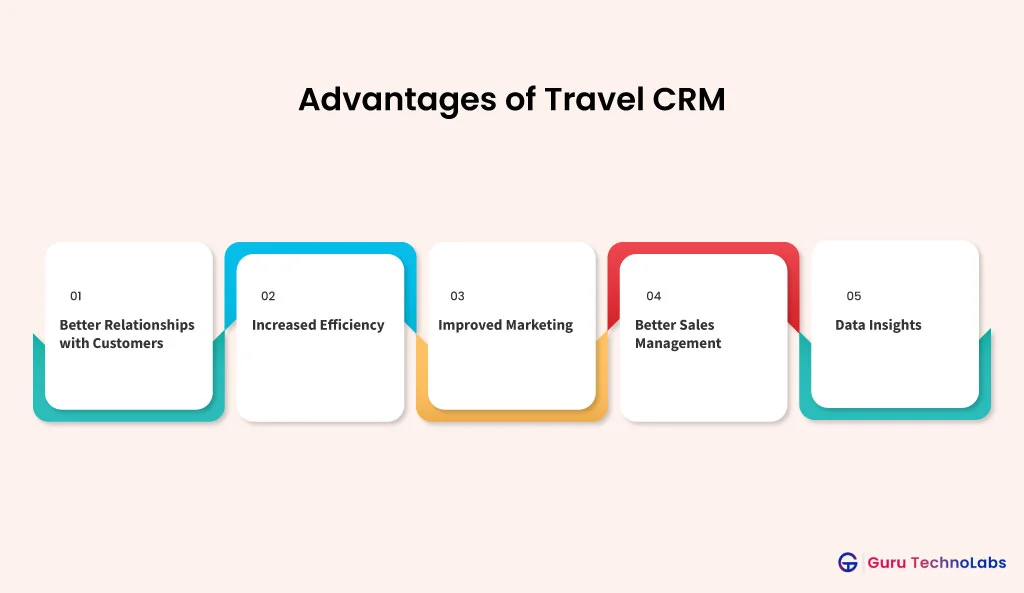
Better Relationships with Customers
A CRM for travel agencies helps you keep track of your customers’ preferences and history. With this information, you can offer more personalized services. For example, if a customer likes beach vacations, you can suggest similar trips in the future. This personal touch makes customers feel special and more likely to come back.
Increased Efficiency
A travel CRM system can help you by doing things automatically, like sending booking confirmations, follow-up emails, and reminders. This saves time and reduces mistakes, so your team can concentrate on more important things.
Improved Marketing
CRM systems can group customers based on what they like and how they act. This means you can make focused marketing plans that are more likely to interest certain groups of people. For example, you can offer special deals to customers who enjoy adventure trips, making your campaign more likely to succeed.
Better Sales Management
A CRM for travel agencies helps sales teams keep track of potential customers and sales opportunities better. It shows where each possible customer is in the sales process and what needs to be done next. This organized approach makes it easier to close deals and sell more.
Data Insights
One great thing about using CRM for the travel industry is that it gives you helpful information about your customers. It can tell you things like what they like and how they behave, which can help you make smarter choices. For instance, if you see that lots of people are booking trips to a certain place, you can put more effort into promoting that destination.
Essential Features of Travel Agency CRM
A travel CRM system can greatly benefit your travel agency, but it’s important to choose one with the right features. Here are some essential features of CRM for the travel industry that you should look for:
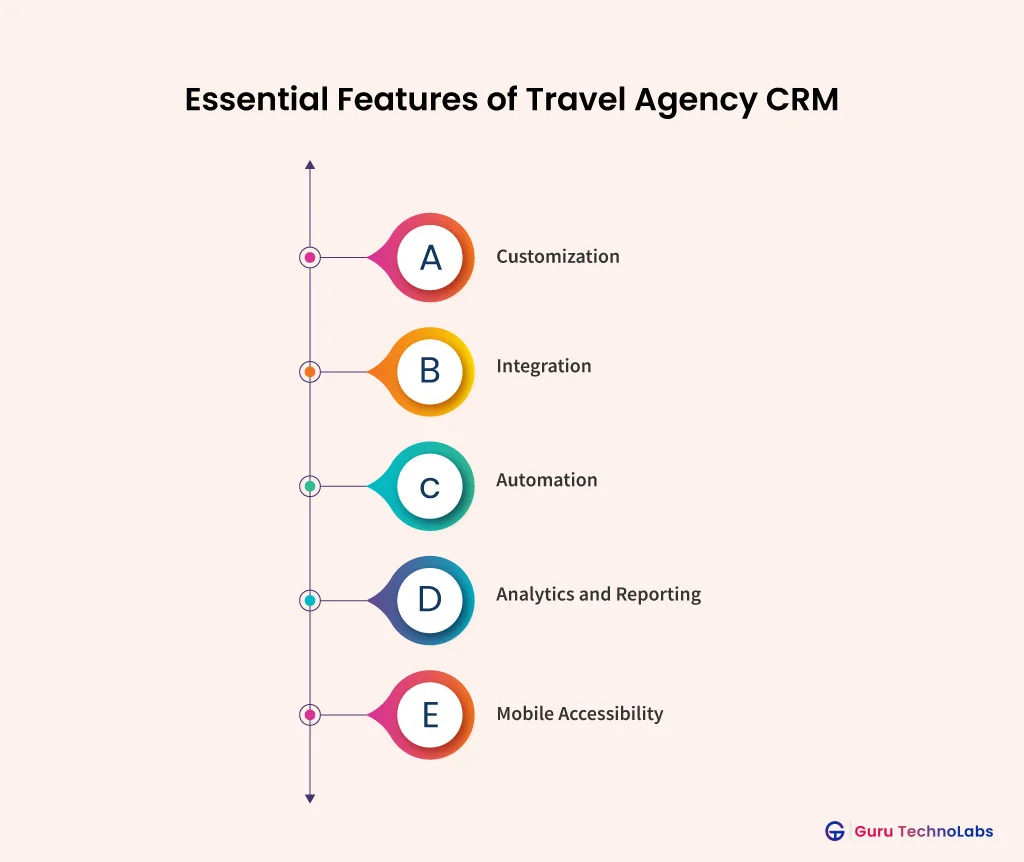
Customization
One of the key features of travel CRM software is customization. Every travel agency is different, so it’s great to have a CRM that you can customize to fit your own needs. This means you can add or remove stuff, make your fields, and set up workflows that work for your agency.
Integration
A good travel CRM should work well with other tools you use, like booking systems, payment processors, and marketing tools. This ensures that all your data moves smoothly between platforms, reducing manual work and mistakes. For instance, if your CRM connects easily with your website, a travel website design company can help improve the customer experience by making sure all booking details are updated correctly between your CRM and website.
Automation
Automation is really important for travel agencies using CRM. It helps save time and keeps things consistent by taking care of repetitive tasks like sending emails, confirming bookings, and reminding customers to follow up. For example, when a booking is made, the CRM can automatically send an email to confirm it and schedule reminders for follow-ups. This not only makes your team work faster but also makes things better for the customers.
Analytics and Reporting
Understanding how your business is doing and what your customers are up to is super important. If you’re in the travel industry, it’s essential to have tools that can help you see how well you’re selling and how your marketing is doing. These tools can show you things like what your customers like to do and where they like to go. With this information, you can make smarter choices about how to improve your services and sell more. For example, you can see which places are the most popular and then change how you advertise to match that.
Mobile Accessibility
In today’s fast-paced world, it’s really important to have access to customer information on your phone. A travel CRM system with mobile accessibility lets you manage customer interactions, see bookings, and get important details from your phone. This means you can stay connected and responsive, even when you’re not at your desk.
These features of a customizable CRM for travel companies make sure that your CRM system can change to fit your needs, make your work smoother, and help you give better service to your customers.
Transform Your Travel Business Today
Discover how you can drive digital transformation in the travel industry,
boosting your agency’s efficiency and customer satisfaction.
Steps to Choose the Right CRM Software for Travel Companies
Choosing the right CRM software for your travel company is an important decision that can greatly impact your operations and customer relationships. Here’s a step-by-step guide to help you navigate through the process:
1. Identify Your Needs
First, figure out what your travel agency really needs. Think about how you want to keep track of customer information, manage bookings, handle emails automatically, and make reports. Every agency is different, so knowing exactly what you need will help you pick the best travel CRM system.
2. Explore Your Options
After figuring out what you need, take some time to check out the different CRM systems that are available. You should search for CRM software that’s made especially for the travel industry since it will likely have features that are perfect for your business. Compare the features, prices, and customer support of each CRM provider to figure out which one is the best match for you.
3. Check Compatibility
Make sure the CRM works well with your other software and systems, like booking engines, payment gateways, and email marketing tools. Good integration will make things run more smoothly and reduce the need for manual data entry.
4. Consider Scalability
Pick a CRM that can expand as your business grows. As your travel agency gets bigger and you have more customers, your CRM system should be able to handle more information and more people using it without slowing down. Scalability means that your CRM will keep on supporting your business as it grows.
5. Evaluate User Experience
User experience is really important when choosing a CRM system for travel. Look for one that is easy to use, simple to understand, and doesn’t require a lot of training. A good design helps your team work better and focus on giving great customer service.
6. Request Demos
Don’t forget to ask for demos from the CRM providers you’re thinking about. This lets you see the CRM in action and decide if it fits your needs. Pay attention to how well the CRM handles the things you need, like managing bookings or keeping track of customer interactions.
7. Read Reviews
Don’t forget to read what other customers are saying about the CRM systems you’re considering. Their reviews can help you understand the good and bad points of each system. Pay attention to reviews from travel agencies like yours to get a better idea of how the CRM performs, how good the customer support is, and whether people are happy with it. This can help you make a better decision.
Follow these steps to pick the best CRM software for your travel company. This software will help you work better, improve relationships with customers, and support the growth of your business. Getting the right travel CRM system will allow you to provide great service and stay ahead in a competitive industry.
Ready-made Travel CRM vs. Custom Travel CRM Development
When you’re choosing a CRM system for your travel agency, you have two main choices: ready-made solutions and custom-built systems. Each option has its pros and cons. Here’s a detailed comparison to help you figure out which one is right for your business.
Ready-made Travel CRM
Ready-made travel CRMs are pre-built tools made for travel agencies. These CRMs are already made and can be set up fast with minimal effort. They have common features like managing customers, keeping track of bookings, and basic reporting tools.
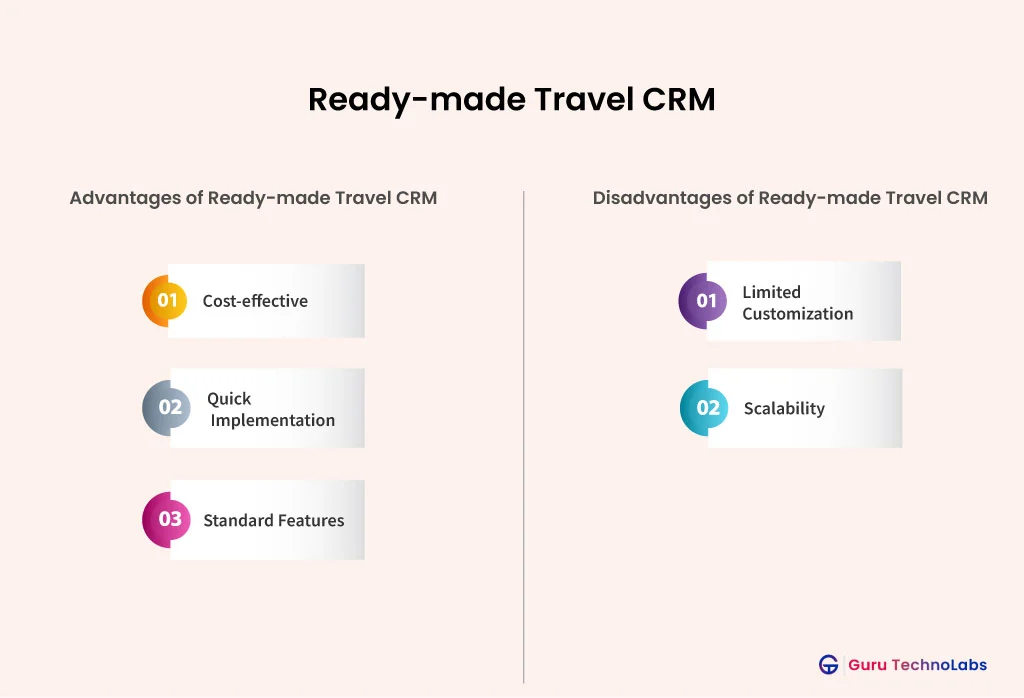
Advantages of Ready-made Travel CRM
- Cost-effective: Ready-made CRMs are cost-effective because they are mass-produced and widely used, making them affordable upfront.
- Quick Implementation: You can start using a ready-made CRM almost immediately after buying it, which saves time on development and setup.
- Standard Features:They come with essential features that most travel agencies need, like booking management and customer database functions.
Disadvantages of Ready-made Travel CRM
- Limited Customization: The problem with ready-made CRMs is that they may not match up perfectly with how your business works. It can be hard to customize them to fit your exact needs.
- Scalability: As your business grows and your needs get more complicated, these systems might not work as well. They’re good for small businesses, but they might not handle the changes as your company gets bigger.
Custom Travel CRM Development
Custom CRMs are made to fit the specific needs of your travel agency. They can be built from the ground up or based on existing systems, but they can be fully adjusted to match your business processes and specific requirements. Creating a custom CRM takes more time and money, but it allows you to have more flexibility and control over the features and functions of the CRM.
To learn more about the custom software development process , check out our custom software development guide.
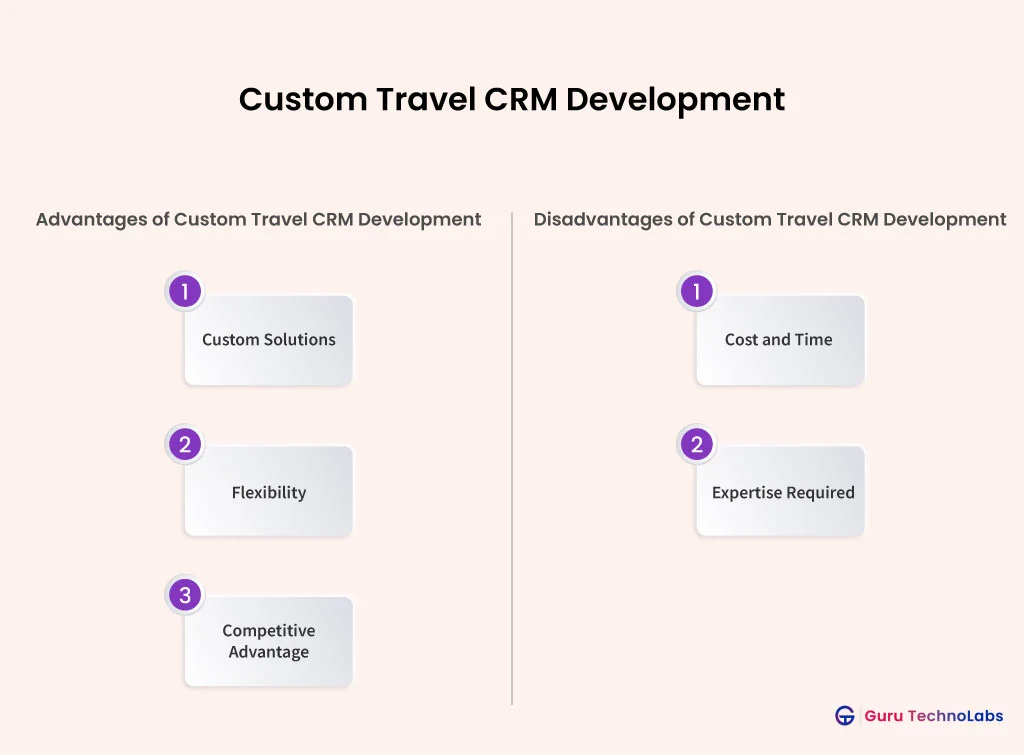
Advantages of Custom Travel CRM Development
- Custom Solutions: You have the freedom to customize the CRM to match your needs and work processes perfectly. This ensures that it integrates smoothly with your existing workflows and fulfills all your business requirements.
- Flexibility: Custom CRMs can grow and improve your business. You have the flexibility to add new features or integrate with other systems as your agency expands.
- Competitive Advantage: A custom CRM can give you a competitive edge by allowing you to offer unique services and experiences to your customers.
Disadvantages of Custom Travel CRM Development
- Cost and Time: Custom development can be more expensive and time-consuming compared to ready-made solutions, as it involves designing, coding, and testing from scratch.
- Expertise Required: You may need to work closely with developers and IT professionals specialized in travel app development to ensure the CRM is developed according to your specifications and requirements.
Choosing the Right Option
Choosing between buying a ready-made travel CRM or building a custom one depends on what your agency needs, how much you can spend, and what your long-term plans are. If you can find a ready-made CRM that has all the features you need and you want a quick solution, that might work for you. But if you need a lot of customization, have unique ways of doing business, and want a CRM that can grow with you in the long run, then building a custom CRM might be the better option for you.
When choosing a CRM system for your travel agency, it’s important to think about what you need to personalize, how much you want it to grow with your business, and how much you’re willing to spend. This will help you pick the best CRM solution to support your agency’s growth and success.
Challenges in Choosing the Right CRM for the Travel/Tourism Business
When it comes to choosing the best CRM system for your travel agency, you might encounter some difficulties. Here are the main problems you might come across and how to deal with them:
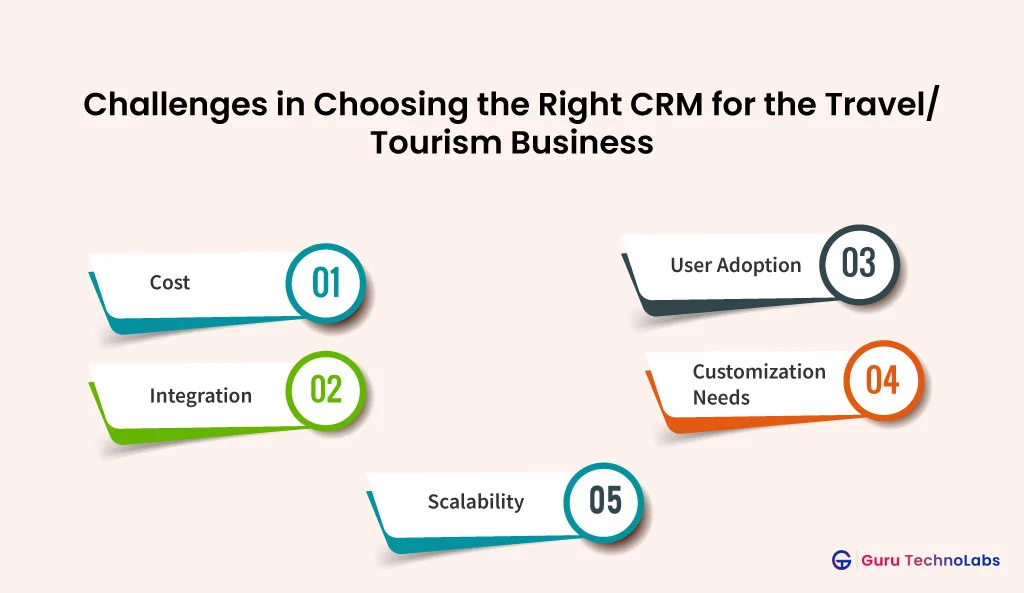
Cost
When choosing a CRM for your travel agency, cost is a big deal. You have to think about what features you need and how much money you have. Ready-made CRMs are cheaper at first, but they might not have all the things you want. Custom-built CRMs give you more options, but they can cost more because they’re made for you.
Integration
Your CRM must work well with the other software you use. It should easily connect with your booking tools, payment systems, and email marketing software. If it doesn’t, you could end up with mistakes in your data, and things might not run smoothly. That’s why it’s crucial to test everything thoroughly and make sure it all works together before you start using it.
User Adoption
It can be really tough to get your team to start using a CRM system properly. Some team members might not like change, or they might find the new system too hard to figure out. To help them get on board, make sure they get enough training and show them how the CRM can make their work easier. Also, make sure to address any worries they might have. To make things easier, pick a CRM that’s easy to use and has features that are easy to understand.
Customization Needs
Every travel agency needs to find a CRM that can be adjusted to fit their individual needs. Ready-made CRMs might not be flexible enough, but custom-built ones can be designed to match your unique ways of working.
Scalability
As your travel agency gets bigger, your CRM should be able to grow, too. Scalability means that the CRM can handle more data, more users, and more transactions without slowing down. Pick a CRM that can scale up so that you can expand your business without having to switch to a new system.
What Questions Travel Business Owners or Travel Agencies Should Ask Before Choosing a CRM?
Functionality and Features
- What core features does the CRM offer, and how do they align with our business needs?
- Does the CRM support multi-channel communication (email, phone, social media)?
- How customizable is the CRM to fit our specific processes and requirements?
- Can the CRM handle both B2B and B2C operations?
Integration Capabilities
- Can the CRM integrate seamlessly with our existing systems (booking engines, accounting software, etc.)?
- Are there APIs available for custom integrations?
- How easy is it to integrate third-party tools and services?
Usability and User Experience
- Is the CRM user-friendly and easy to navigate?
- What kind of training and support is available for our team?
- How intuitive is the CRM for managing customer interactions and data?
Data Management and Security
- How does the CRM ensure data privacy and security?
- What measures are in place for data backup and recovery?
- Can we easily migrate our existing data into the CRM?
Scalability and Flexibility
- Can the CRM scale with our business as we grow?
- What limitations exist in terms of the number of users or data storage?
- How adaptable is the CRM to changing business needs?
Customer Support and Training
- What level of customer support is available (24/7, dedicated account manager, etc.)?
- Are there comprehensive training resources and documentation available?
- How responsive is the support team in resolving issues?
Cost and ROI
- What is the total cost of ownership, including licensing, implementation, and ongoing maintenance?
- Are there any hidden fees or additional costs?
- How does the CRM help improve ROI through increased efficiency and customer satisfaction?
Reporting and Analytics
- What reporting and analytics capabilities does the CRM offer?
- Can we generate custom reports and dashboards?
- How does the CRM help in tracking and analyzing customer interactions and sales performance?
Vendor Reputation and Reliability
- What is the vendor’s track record and reputation in the travel industry?
- Are there any customer testimonials or case studies available?
- How long has the vendor been in business, and what is their market position?
Implementation and Onboarding
- What is the typical implementation timeline?
- What kind of support is provided during the onboarding process?
- Are there any success stories of similar businesses successfully implementing the CRM?
By addressing these questions, travel business owners and agencies can make a well-informed decision when selecting a CRM that best fits their needs and helps overcome their challenges.
Still Confused About What Questions to Ask?
Contact us today for free consultation! Our experts are here to help you
navigate the process and find the right CRM solution for your travel business needs.
How Guru TechnoLabs Can Help You with Custom Travel CRM Development and Ready-made Travel CRM?
At Guru TechnoLabs, we offer different types of CRM solutions designed to help your travel agency work better. Our ready-to-use travel CRMs can be set up quickly and come with all the important features for managing customer relationships and making your business run more smoothly. But we understand that your agency might need some extra features or connections to other software to fit your specific needs. Our team can make these additions so that the CRM works exactly the way you want it to.
If you need something even more personalized, we can create a custom CRM just for your travel business. Whether you want an advanced booking system, tools for talking to customers, or detailed reports, our experts will work closely with you to build a CRM from scratch or adapt an existing one. This means your custom CRM will not only meet your expectations but also help your agency provide great service and grow your business. By working with Guru TechnoLabs, you can make the most of your CRM and succeed in the competitive travel industry.
Explore Our CRM Portfolio
Check out our portfolio to see how we’ve helped manufacturers connect with
logistics & supply chains and carry out their day-to-day operations easily.
Conclusion
Choosing the right CRM system for your travel agency is a big deal. It can make a big difference in how well your business does. First, figure out exactly what you need. Then, check out all the different options available. Compare the features and see if they’ll work well with how your agency runs. A good CRM system can help you run things more smoothly, make your customers happier, and boost your sales. It’s a useful tool for making things work better, providing better service, and staying competitive in the travel industry.
Frequently Asked Questions
A CRM helps make customers happy by providing personalized services based on each traveler's preferences. It makes sure that we answer questions and feedback promptly, making our conversations smoother and more effective.
A CRM is crucial for travel companies because it helps manage and organize customer information effectively. It automates tasks like booking confirmations and follow-up emails, which saves time and reduces errors. It also enhances marketing efforts by targeting customers with personalized offers and promotions based on their preferences.
A CRM enhances customer experience by keeping track of individual preferences and past interactions. This allows travel agencies to provide personalized services that meet each customer's needs. It ensures timely communication and follow-up, making the entire travel booking and service process more seamless and enjoyable for customers.
It depends on the company’s needs. Cloud-based CRMs offer flexibility and lower upfront costs, while on-premise CRMs provide more control and customization options.
CRMs enable travel companies to segment customers based on behavior and preferences, leading to targeted marketing campaigns and more effective customer acquisition strategies.
Integrating a Travel CRM with systems like booking engines and email marketing tools improves data flow, enhances efficiency, and boosts customer service by automating processes and ensuring seamless communication.
Yes, a CRM can assist by organizing customer data and preferences. It enables targeted marketing campaigns and tracks their success, improving how you engage with customers.
The cost varies based on your business needs. Contact our experts for a personalized quote that fits your specific requirements.
A CRM enhances customer service by centralizing customer information. It helps in providing personalized service, ensuring timely responses, and managing customer interactions effectively.
Yes, many travel CRMs are designed to integrate smoothly with booking engines, payment gateways, and other essential systems. This integration streamlines operations and enhances efficiency.
Absolutely, most CRMs offer customization options to tailor the system to your unique business processes. Contact our team to discuss how we can create a CRM solution that meets your exact requirements.



